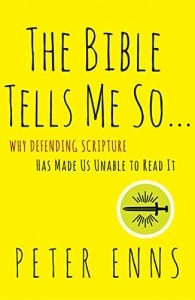 Peter Enns and I both released important books about the Bible this year. Peter’s book is called The Bible Tells Me So, and mine is called We Make the Road by Walking. We decided to interview each other about our books and what they say about the Bible. This is Part 3 of 3.
Peter Enns and I both released important books about the Bible this year. Peter’s book is called The Bible Tells Me So, and mine is called We Make the Road by Walking. We decided to interview each other about our books and what they say about the Bible. This is Part 3 of 3.
+++++
Brian: What is your biggest hope for the book? What would success look like?
Peter: Besides getting me interviewed by Brian McLaren and the book having a bright canary yellow cover I can use as a night-light, my biggest hope for the book is to help people see that their faith does not rest in “holding on” to the kind of Bible that they know deep down they simply can’t hold on to.
I want to give them permission to decouple the viability of their faith from the perceived need to base that faith on a problem-free Bible. I hope my book offers a different set of expectations about what the Bible is and what it is there to do for us that makes sense to them on their own Christian pilgrimage.
I hope those who read the book will be challenged and/or encouraged to feel the freedom to think about God and their lives in communion with God in ways they might not have expected. I can’t define what that is, of course.
For those for whom the Bible has become an obstacle to faith rather than a source of faith, I hope they will be able to take a deep breath and know there is no need to keep staring over the cliff’s edge and consider jumping. Get back on the path and keep walking.
I hope for those who have left the faith to see that maybe the faith they left was a false faith, a parody, a form of Christianity where the Bible was loaded with false expectations of scientific or historical accuracy and absolute moral mandates, and they walked away from the faith because they rightly couldn’t reconcile that non-negotiable expectation with their own reason and experience.
I want people to honor and respect Scripture as a God-sanctioned companion on their faith journey, but without thinking of the Bible as an owner’s manual or complete how-to book. I want them to see that honoring and loving the Bible does not mean living with the constant pressure of having to “get the Bible right” or suffer the consequences of a touchy, nit-picky God if they don’t.
Rather, I want them to look on their faith in God as source of joy, love, contentment, comfort, and hope, and the Bible as book that, in its own ancient and sometimes odd ways, informs and models that faith for them.
Peter: With three 20-something offspring, I have had all sorts of occasions to reflect on how “dominant evangelical culture” has not supplied them with a compelling story, one that connects with and helps them make sense of the world they live in. In a word, the almost exclusive focus on maintaining orthodoxies (“being faithful to the past”) has come at the expense of delivering a viable faith for them on their life journey (“being faithful to the future”). In your traveling and speaking, I’m sure you engage a lot of people with similar perceptions. I’d love to hear you comment a bit on what you think it means for the church to take responsibility to be “faithful to the future” and not just the past.
Brian: Wow. That is a truly important question. I often tell the story about a conversation with a parent whose son had come out as gay shortly after one of my adult kids came out. “If I accept my son as a gay man,” he said with tears, “I feel I am rejecting my father, who will never be willing to accept my son. If I accept my son as a gay man, I feel I am rejecting my father.” In being faithful to our ancestors, we can betray our descendants.
That’s one reason I love Jesus so much. As I try to explain in WMTRBW, his statement, “I have not come to abolish the Law and Prophets, but fulfill them,” addresses this problem powerfully. The ancient tradition was a path, a way of dealing with realities in the time and place where it arose. It set people on a trajectory whose intent their descendants had to discern. Jesus understood that sometimes overturning the tradition was necessary to fulfill its intent.
So, focusing on food taboos might have been essential at one point in their history. But now, he said, it’s time to realize that what goes into a person isn’t what matters; it’s what comes out of a person that matters. Similarly, sacrifice and a temple to house it had their social and spiritual function in the past, but the time had come to realize that neither temple nor sacrifice really mattered. What God desired was compassion, not sacrifice … and the Spirit was available everywhere, not just on this or that temple on this or that mountain.
Religions and people that don’t understand and fulfill the intent of tradition become brittle and reactionary, backward-looking and fearful of the present and future. Religions and people that understand what Jesus meant by fulfilling the tradition become creative and wise guides into the future. I think that’s what people like you and I are trying to do, Peter – understand our tradition, understand its highest and best intent, and seek to live out and extend that intent into our own present and future.











